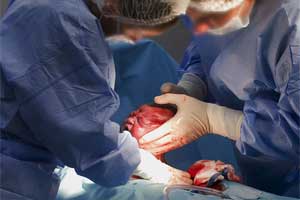- Home
- Editorial
- News
- Practice Guidelines
- Anesthesiology Guidelines
- Cancer Guidelines
- Cardiac Sciences Guidelines
- Critical Care Guidelines
- Dentistry Guidelines
- Dermatology Guidelines
- Diabetes and Endo Guidelines
- Diagnostics Guidelines
- ENT Guidelines
- Featured Practice Guidelines
- Gastroenterology Guidelines
- Geriatrics Guidelines
- Medicine Guidelines
- Nephrology Guidelines
- Neurosciences Guidelines
- Obs and Gynae Guidelines
- Ophthalmology Guidelines
- Orthopaedics Guidelines
- Paediatrics Guidelines
- Psychiatry Guidelines
- Pulmonology Guidelines
- Radiology Guidelines
- Surgery Guidelines
- Urology Guidelines
Cesarean delivery associated with increased pregnancy complications for mothers

FRANCE: Compared with vaginal delivery, cesarean delivery is associated with a higher risk of severe acute maternal morbidity, shows a recent study published in the Canadian Medical Association Journal (CMAJ). The risk is starker in women aged 35 years and older.
"Clinical decisions regarding delivery mode should account for this excess risk accordingly, particularly for older mothers," write the authors.
Short-term maternal complications of cesarean delivery remain uncertain because of confounding by indication. Diane Korb, an obstetrician, and epidemiologist with the Robert Debre Hospital and INSERM, Paris, France, and colleagues assessed whether cesarean delivery is associated with severe acute intra- or postpartum maternal morbidity compared with vaginal delivery, overall and according to the timing of the cesarean.
Cesarean delivery is a useful intervention for mothers and newborns in many situations. Its rates have increased dramatically over the last 20 years, with more than 1 in 5 women delivering by cesarean, often for medically questionable reasons. The range of indications for cesarean delivery appears to have broadened considerably, with more cesarean deliveries likely to be performed for questionable medical indications. This increase requires an evaluation of its potential adverse consequences on maternal and neonatal health.
"Maternal complications may be the result of the condition that led to the cesarean delivery rather than from the surgical procedure, producing an apparent association between cesarean delivery and maternal complications," says Dr. Korb.
To understand if cesarean deliveries are associated with severe maternal complications, French researchers used a subcohort of a larger study (the EPIMOMS study) to compare 1444 women who experienced severe complications after delivery with 3464 controls who did not experience complications, in 6 French regions. They controlled for factors that might influence the findings and adjusted for baseline risk. They excluded women with pre-existing health conditions that could lead to complications.
Also Read: Cesarean delivery carries least risk of pelvic floor disorders after childbirth: JAMA
Key findings of the study include:
- The proportion of cesarean delivery was significantly higher among cases than controls (36.0% v. 18.2%).
- In the propensity score-matched analysis, cesarean deliveries were significantly associated with a higher risk of severe acute maternal morbidity.
- This association increased with maternal age and was particularly marked for women aged 35 years or older.
- This increased risk was significant for cesarean deliveries during labor in women of all age groups and for those before labor only in women aged 35 years or older.
- Most severe maternal complications involved hemorrhage after delivery; the ability of the uterus to contract reduces with advanced maternal age.
Also Read: Elective cesarean increases risk of early childhood obesity: JAMA
"Our results raise questions about the practices of some obstetricians who perform cesarean deliveries because of advanced maternal age, perhaps with the idea that there will probably be no future pregnancies," says Dr. Korb. "This practice should be modified to avoid unnecessarily exposing women older than 35 to the risk of severe acute maternal morbidity."
For detailed study follow the link: https://doi.org/10.1503/cmaj.181067

Disclaimer: This site is primarily intended for healthcare professionals. Any content/information on this website does not replace the advice of medical and/or health professionals and should not be construed as medical/diagnostic advice/endorsement or prescription. Use of this site is subject to our terms of use, privacy policy, advertisement policy. © 2020 Minerva Medical Treatment Pvt Ltd